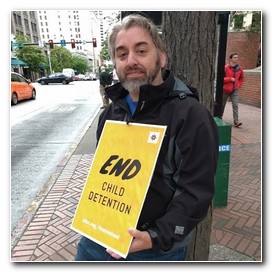Editor’s note: Since this essay was written, Transgender Awareness Week has emerged as a weeklong celebration leading up to Transgender Day of Remembrance.
The Transgender Day of Remembrance is an important day. Every year on November 20th we gather to mourn those who are murdered for being transgender, or for loving someone who is trans.
This is needed for so many reasons. Chief among them is that our murdered cousins may die with no one to mourn their passing. It also provides the TGI communities an opportunity to grieve publicly and call attention to the rampant horror of reality. And the reality is that there are people in this world who know they won’t really get in trouble for getting rid of us. On the contrary, they will get very light sentences, if they’re tried at all. And often everyone, from the cops on down, will congratulate them for their crime.
In the face of all of this, how can we treasure our lives? Can we hold our heads high and think well of ourselves — or have the hateful and negative messages seeped into our bones, tainting what we see when we look into the mirror? Is our self-esteem based solely on how far along we are in transition? Or is there more?
While it’s good to mourn, we also must celebrate those of us who are still here. There is growing recognition of this, with several places attaching affirming events to their TDOR ceremonies. This is good. We must begin to break away from this subconscious cultural rule that we’re required to die violently before our community is interested in learning about our lives.
The most recent addition to this celebration of our lives is Transgender Day of Visibility. Organized over Facebook, March 31st has been declared a day that we focus on the positive things about being trans. There’s an interview about it here.
I have some other, more general ideas about how to honor our lives:
- Celebrate milestones that are NOT transition related. Birthdays, cementing of relationships through legal marriage or commitment ceremonies, and having children. Building families of our own is a heroic thing in cultures that can make day to day living a high stakes game.
- Publicly honor those who achieve self improvement goals. So many of us end up dropping out of school due to harassment. When we graduate, get a GED, and get those higher degrees, this should be a major source of pride for the whole community. The same thing with getting a new job, moving up the ranks in a union, or starting a business. When one of us reaches a big goal, then others see that we don’t have to be limited by the hate around us.
- Buy from our own businesses whenever possible. Where people spend their money matters. What better way to wish our business owners success than to help their bottom line?
These days, as we face more backlash, it feels like our cultural narrative is narrowing faster and faster. We talk more of death, discrimination, job loss, and homelessness.
But how can we see ourselves as whole people if we don’t lift up our heads and talk about our whole lives? We are so much more than what the culture does to us. And we have more worth, strength, and talent than we have even begun to explore as a people.
The time has come to sit and talk to each other. Not about ENDA, job loss, surgery, or hormones. But about the other heroic things we do every day.
Let us create new ceremonies and stories. So many of us deserve honor for things we achieve. Remember, others take these life milestones for granted. Cisgender people just assume that they will achieve them, because others in their family and culture have.
As TDOR reminds us every year, we may not be around long enough, through no fault of our own, to reach our goals and realize our dreams.
Our lives and stories are precious. Reach out to each other in respect and honor the everyday heroes among us.
You may also enjoy:
You Are God’s Masterpiece: Celebrating 25 Years of Being a Whosoever
Bulletproof Faith: A Spiritual Survival Guide for Gay and Lesbian Christians

Michigan native Lincoln Rose relocated to Seattle in the mid-2000’s, where he pursued religious studies and became active in the local community as a member of Trans Lives Matter, the Trans Jail Policy Group and Emerald City MCC Seattle.
